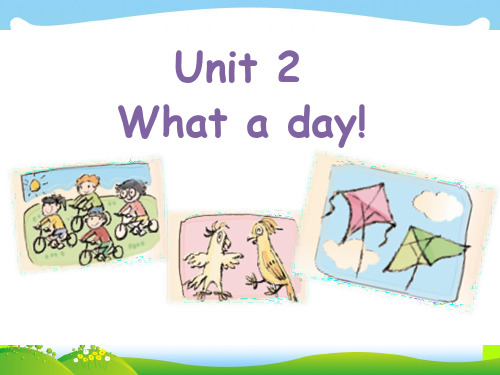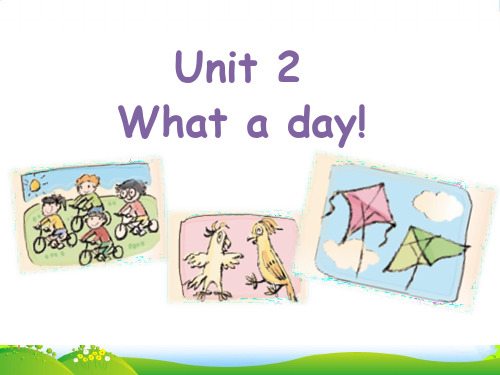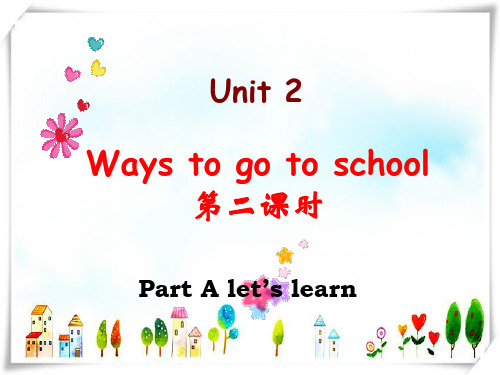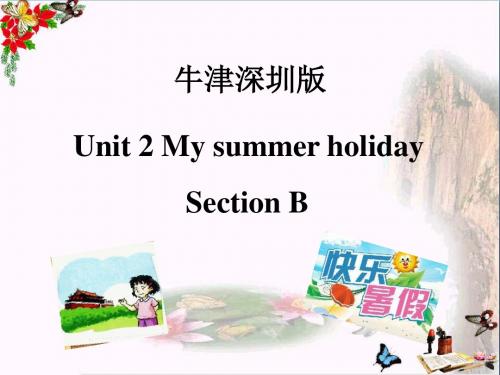六年级上册-Unit2-第二课时PPT课件
合集下载
新牛津译林苏教版六年级英语上册Unit 2 What a day第二课时优质公开课课件.ppt

7. 我们刚才在公园里放风筝。 We flew kites in the park just now.
Unit 2 What a day! Yang Ling’s diary:
Try to recite Yang Ling’s diary!
Unit 2 What a day!
Magic cards
• 13、志不立,天下无可成之事。2020/8/142020/8/142020/8/142020/8/148/14/2020
• 14、Thank you very much for taking me with you on that splendid outing to London. It was the first time that I had seen the Tower or any of the other famous sights. If I'd gone alone, I couldn't have seen nearly as much, because I wouldn't have known my way about.
Unit 2 What a day!
It was … I … in the …
Unit 2 What a day!
It was … I … in the …
Unit 2 What a day!
It was … I … in the …
Unit 2 What a day!
It was … I … in the …
1. 今天上午天气晴朗。 It was sunny in the morning.
2. 天空中有许多乌云。 There are a lot of black clouds in the sky.
Unit 2 What a day! Yang Ling’s diary:
Try to recite Yang Ling’s diary!
Unit 2 What a day!
Magic cards
• 13、志不立,天下无可成之事。2020/8/142020/8/142020/8/142020/8/148/14/2020
• 14、Thank you very much for taking me with you on that splendid outing to London. It was the first time that I had seen the Tower or any of the other famous sights. If I'd gone alone, I couldn't have seen nearly as much, because I wouldn't have known my way about.
Unit 2 What a day!
It was … I … in the …
Unit 2 What a day!
It was … I … in the …
Unit 2 What a day!
It was … I … in the …
Unit 2 What a day!
It was … I … in the …
1. 今天上午天气晴朗。 It was sunny in the morning.
2. 天空中有许多乌云。 There are a lot of black clouds in the sky.
陕旅版六年级英语上册Unit2 第二课时课件全面版

巩固练习
二、用所给词语的适当形式填空。 1、She_b__r_u_s_h_e_s_ (brush) her teeth at half past s 2、It’s time_t_o__h_a_v_e__ (have) a rest. 3、She is a__h_e_a_l_th__y_ (health) girl. 4、Tom goes boating_t_w__i_c_e_ (two) a week. 5、Lucy_d__o_e_s_ (do) well in her study.
重难点探究
重点词汇42
how often 多久一次
例句 How often do you see your grandpare 你多久去看你祖父母一次?
how often does he go shopping? 他多久去购物一次?
重难点探究
重点句型1 You look healthy, Liu Zhaoyan 你看起来很健康, 刘朝阳。
— I drink milk every day. 我每天都喝牛奶。
课后作业
Homework
1.听录音跟读对话。 2.根据本课对话自编对话 。 3.完成本课时相关练习。
Thank You
只要我们坚持了,就没有克服不了的困难。或许,为了将来,为了自己的发展,我们会把一件事情想得非常透彻,对自己越来越严,要求越来越高,对任何机会都不曾错过,其 目的也只不过是不让自己随时陷入逆境与失去那种面对困难不曾屈服的精神。但有时,“千里之行,始于足下。”我们更需要用时间持久的用心去做一件事情,让自己其中那小 小的浅浅的进步,来击破打破突破自己那本以为可以高枕无忧十分舒适的区域,强迫逼迫自己一刻不停的马不停蹄的一直向前走,向前看,向前进。所有的未来,都是靠脚步去 丈量。没有走,怎么知道,不可能;没有去努力,又怎么知道不能实现?幸福都是奋斗出来的。那不如,生活中、工作中,就让这“幸福都是奋斗出来的”完完全全彻彻底底的 渗入我们的心灵,着心、心平气和的去体验、去察觉这一种灵魂深处的安详,侧耳聆听这仅属于我们自己生命最原始最动人的节奏。但,这种聆听,它绝不是仅限于、执着于 “我”,而是观察一种生命状态能够扩展和超脱到什么程度,也就是那“幸福都是奋斗出来的”深处又会是如何?生命不止,奋斗不息!又或者,对于很多优秀的人来说,我们 奋斗了一辈子,拼搏了一辈子,也只是人家的起点。可是,这微不足道的进步,对于我们来说,却是幸福的,也是知足的,因为我们清清楚楚的知道自己需要的是什么,隐隐约 约的感觉到自己的人生正把握在自己手中,并且这一切还是通过我们自己勤勤恳恳努力,去积极争取的!“宝剑锋从磨砺出,梅花香自苦寒来。”当我们坦然接受这人生的终局, 或许,这无所皈依的心灵就有了归宿,这生命中觅寻处那真正的幸福、真正的清香也就从此真正的灿烂了我们的人生。一生有多少属于我们的时光?陌上的花,落了又开了,开 了又落了。无数个岁月就这样在悄无声息的时光里静静的流逝。童年的玩伴,曾经的天真,只能在梦里回味,每回梦醒时分,总是多了很多伤感。不知不觉中,走过了青春年少, 走过了人世间风风雨雨。爱过了,恨过了,哭过了,笑过了,才渐渐明白,酸甜苦辣咸才是人生的真味!生老病死是自然规律。所以,面对生活中经历的一切顺境和逆境都学会 了坦然承受,面对突然而至的灾难多了一份从容和冷静。这世上没有什么不能承受的,只要你有足够的坚强!这世上没有什么不能放下的,只要你有足够的胸襟! 一生有多少 属于我们的时光?当你为今天的落日而感伤流泪的时候,你也将错过了明日的旭日东升;当你为过去的遗憾郁郁寡欢,患得患失的时候,你也将忽略了沿途美丽的风景,淡漠了 对未来美好生活的憧憬。没有十全十美的生活,没有一帆风顺的旅途。波平浪静的人生太乏味,抑郁忧伤的人生少欢乐,风雨过后的彩虹最绚丽,历经磨砺的生命才丰盈而深刻。 见过了各样的人生:有的轻浮,有的踏实;有的喧哗,有的落寞;有的激扬,有的低回。肉体凡胎的我们之所以苦恼或喜悦,大都是缘于生活里的际遇沉浮,走不出个人心里的 藩篱。也许我们能挺得过物质生活的匮乏,却不能抵挡住内心的种种纠结。其实幸福和欢乐大多时候是对人对事对生活的一种态度,一花一世界,一树一菩提,就是一粒小小的 沙子,也有自己精彩的乾坤。如果想到我们终有一天会灰飞烟灭,一切象风一样无影亦无踪,还去争个什么?还去抱怨什么?还要烦恼什么?未曾生我谁是我?生我之时我是谁? 长大成人方是我,合眼朦胧又是谁?一生真的没有多少时光,何必要和生活过不去,和自己过不去呢。你在与不在,太阳每天都会照常升起;你愁与不愁,生活都将要继续。时
六年级上册英语课件Module2 Unit2(2)_外研社(三起)

Module2 Unit2
There are lots of beautiful lakes in China
在中国有很多美丽的湖泊
Review 复习
Words: strong : 1、坚固的
2、强壮的 eg: 1、The Great Wall is strong.
长城是坚固的。 2、He is strong.
3、Look and say
Look at the four pictures on page 12. Can you say something about it ? 1、There are five pupils on the Great Wall. 2、There are lots of pictures on the wall. 3、There are two boats on the river.
1._T_h_e_r_e _a_re___three noodle shops in the picture . 2._T_h_e_r_e_a_re____ seven buses in the picture.
3. _T_h_e_r_e_ _is___a railway station in the picture. 4._T_h_e_r_e_’s a hospital in the picture.
5. _T_h_e_re_’_s a library in the picture. 6. _T_h_e_re_’_s a supermarket in the picture. 7._T_h_e_r_e_’s a station in the picture.
There are lots of computers in the classroom. There are lots of desks in the classroom .
There are lots of beautiful lakes in China
在中国有很多美丽的湖泊
Review 复习
Words: strong : 1、坚固的
2、强壮的 eg: 1、The Great Wall is strong.
长城是坚固的。 2、He is strong.
3、Look and say
Look at the four pictures on page 12. Can you say something about it ? 1、There are five pupils on the Great Wall. 2、There are lots of pictures on the wall. 3、There are two boats on the river.
1._T_h_e_r_e _a_re___three noodle shops in the picture . 2._T_h_e_r_e_a_re____ seven buses in the picture.
3. _T_h_e_r_e_ _is___a railway station in the picture. 4._T_h_e_r_e_’s a hospital in the picture.
5. _T_h_e_re_’_s a library in the picture. 6. _T_h_e_re_’_s a supermarket in the picture. 7._T_h_e_r_e_’s a station in the picture.
There are lots of computers in the classroom. There are lots of desks in the classroom .
六年级英语上册 Module 2 Unit 2 课件 人教

West Lake
Great Wall
New words
strong
坚固的
1 Listen and chant.
The Huangshan Mountain is high. The Changjiang River is long. The West Lake is beautiful. The Great Wall is strong.
NEW YORK CITY Dear Mum, I hope you like this postcard. On it you can see a street in New York. There are lots of taxis in the street. _T_h_e_re__i_s_a__c_lo__th_e_s__s_h_o_p_a_n__d_a _re_s_t_a_u_r_a_n_t._O__u_ts_i_d_e_t_h_e__c_a_fé_,_ _th_e_r_e_a_r_e__s_o_m_e__p_e_o_p_l_e_d_r_in_k_i_ng _c_o_ff_e_e_. ___________________ Love, Daming
Unit 2 There are lots of beautiful lakes in China.
Module 2
Lead – in
Do you know what are these places in the following pictures?
Huangshan
Changjiang River
5 Listen and say . Then sing.
THERE’S A GREAT WALL IN CHINA
There’s a Great Wall in China. It is very , very long. There’s a Great Wall in China. It is very , very strong. There are many , many people and they like to sing this song.
人教版六年级英语上册Unit2 ppt课件

How do you come to school?
人教版六年级英语上册Unit2
I come by ship .
人教版六年级英语上册Unit2
How do you come to school?
人教版六年级英语上册Unit2
I come by bike .
人教版六年级英语上册Unit2
How does he get there? He gets there ….
人教版六年级英语上册Unit2
How do you come to school?
人教版六年级英语上册Unit2
I come by taxi.
人教版六年级英语上册Unit2
How do you come to school?
人教版六年级英语上册Unit2
I come by bus .
人教版六年级英语上册Unit2
人教版六年级英语上册Unit2
let's learn PartB
人教版六年级英语上册Unit2
Traffic lights
人教版六年级英语上册Unit2
slow
人教版六年级英语上册Unit2
down
人教版六年级英语上册Unit2 Nhomakorabeatop人教版六年级英语上册Unit2
helmet
人教版六年级英语上册Unit2
早到的
从 到达/到 人教版六年级英语上册Unit2
How does he get to the UK from China?
三单形式
人教版六年级英语上册Unit2
选择正确的答案。
( B )1.Usually I go to school on foot .
新牛津译林苏教版六年级英语上册Unit 2 What a day第二课时优质公开课课件

They went to the cinema yesterday.
Unit 2 What a day!
翻译句子:
5. 我午饭吃了一个汉堡。 I had a hamburger for lunch.
6. 我们今天下午看见一些鹦鹉。 We saw some parrots this afternoon.
谢谢观赏
You made my day!
我们,还在路上……
Let’s cheer together, my dear!
cheer 欢呼,喝彩
[ɪǝ]
Unit 2 What a day!
•不习惯读书进修的人,常会自满于现状,觉得再没有什么事情需要学习,于是他们不进则退。经验丰富的人读书用两只眼睛,一只眼睛看到纸面上的话,另 一眼睛看到纸的背面。2022年3月29日星期二2022/3/292022/3/292022/3/29 •书籍是屹立在时间的汪洋大海中的灯塔。2022年3月2022/3/292022/3/292022/3/293/29/2022 •正确的略读可使人用很少的时间接触大量的文献,并挑选出有意义的部分。2022/3/292022/3/29March 29, 2022 •书籍是屹立在时间的汪洋大海中的灯塔。
Rule: Pick(挑选) three cards and
[ɪ]
make some new sentences.
Unit 2 What a day! It was sunny. I played basketball in the playground.
Unit 2 What a day!
It was … I … in the …
1. 今天上午天气晴朗。 It was sunny in the morning.
Unit 2 What a day!
翻译句子:
5. 我午饭吃了一个汉堡。 I had a hamburger for lunch.
6. 我们今天下午看见一些鹦鹉。 We saw some parrots this afternoon.
谢谢观赏
You made my day!
我们,还在路上……
Let’s cheer together, my dear!
cheer 欢呼,喝彩
[ɪǝ]
Unit 2 What a day!
•不习惯读书进修的人,常会自满于现状,觉得再没有什么事情需要学习,于是他们不进则退。经验丰富的人读书用两只眼睛,一只眼睛看到纸面上的话,另 一眼睛看到纸的背面。2022年3月29日星期二2022/3/292022/3/292022/3/29 •书籍是屹立在时间的汪洋大海中的灯塔。2022年3月2022/3/292022/3/292022/3/293/29/2022 •正确的略读可使人用很少的时间接触大量的文献,并挑选出有意义的部分。2022/3/292022/3/29March 29, 2022 •书籍是屹立在时间的汪洋大海中的灯塔。
Rule: Pick(挑选) three cards and
[ɪ]
make some new sentences.
Unit 2 What a day! It was sunny. I played basketball in the playground.
Unit 2 What a day!
It was … I … in the …
1. 今天上午天气晴朗。 It was sunny in the morning.
人教版PEP英语六年级上册Unit2ALet'slearn-课件

➢ He who falls today may rise tomorrow.
子天
是开
梅放
花;
,有
选的
择孩
在子
冬是
天荷
开花
放,
选
择
在
夏
我们,还在路上……
by taExi by suFbway by shGip
by Cbike by caHr
by Dtrain by plIane
Beijing the USA
the bank …
Shanghai
Excuse me! How do you go to ?
I go to
by train/plane/ship/……on foot.
• First they go to the sea by bike.
• Then they go to the sea on foot.
• And they go to the sea by bus.
• At last,they go to the sea by plane.
• They get to the sea at last. • Look at the sea,they are very happy.
How do you go to Hangzhou? I go to Hangzhou… .
by plane by ship by train
ai |ei| train wait rain painting
How do you go to Hangzhou?
I go to Hangzhou… .
Do you know other vehicles?
• motorcycle
人教版英语六年级上册Unit 2 第二课时-课件

What/How about you?
I go to
by … .
词库:by bus, by bike, by train, by subway, by plane, by ship, by boat, by jeep, on foot
• They want to go to the sea. • How do they go to the sea?
by bike,too.
How do you go to school?
How do you go to school? I go to school… .
by bike
by car
by taxi
on foot
by bus
How do you go to school? I go to school by bike. How do you go to school? I go to school by car. How do you go to school? I go to school by taxi. How do you go to school? I go to school by bus. How do you go to school? I go to school on foot.
• At last,they go to the sea by plane.
They get to the sea at last.Look at the sea,they are very happy.
数阅
学读
使使
人人
精充
细实
;;
博会
物谈
使使
人人
深敏
沉捷
;;
You made my day!
人教版六年级英语上册unit2 第二课时 教学课件

( F )1. Every week I go to the park . ( T )2. I often go to Xinhua bookstore by bus . ( T )3.Traffic lights are the same in every country . ( F )4. Traffic rules are the same in every country . ( F )5.We shouldn’t remember the traffic rules .
( B )1.Usually I go to school on foot .
A. 我经常步行去上学.
B.我通常步行去上学.
( B )2. How can I get to Jiufeng Park ?
A. 我怎样九峰公园? B. 你怎样去九峰公园?
( B )3.我乘飞机去上海.
A. I go to Shanghai by ship . B. I go to Shanghai by plane .
train
Guessing game
It’s a kind of train. It’s under the ground. It runs fast. What’s this?
subway
HOME
How does he get there?
He gets there ….
by car by bus by bike by taxi
subway
train
Read& Recite
by 乘… ship 轮船
subway 地铁 on foot 步行
taxi 出租车 slow 慢的
bus 公共汽车 down 减少,降低
( B )1.Usually I go to school on foot .
A. 我经常步行去上学.
B.我通常步行去上学.
( B )2. How can I get to Jiufeng Park ?
A. 我怎样九峰公园? B. 你怎样去九峰公园?
( B )3.我乘飞机去上海.
A. I go to Shanghai by ship . B. I go to Shanghai by plane .
train
Guessing game
It’s a kind of train. It’s under the ground. It runs fast. What’s this?
subway
HOME
How does he get there?
He gets there ….
by car by bus by bike by taxi
subway
train
Read& Recite
by 乘… ship 轮船
subway 地铁 on foot 步行
taxi 出租车 slow 慢的
bus 公共汽车 down 减少,降低
六年级英语上册Unit2Mysummerholiday(第2课时)精选教学PPT牛津上海版

那些年,那些记忆。那些所历的每一幕。都是离别的痕迹,每一个夜上都是一个难眠的夜。有些事情,在经过了时间的沉淀之后。总会被遗忘在角落,而有些身影则相遇在风景无限的沧海。以为这样会一直走下去,当岁月划过。留下记忆的沧桑,是否会想起某个场景。触发埋藏在心底深处的泛黄,或许才明白。当初所谓的遗忘,也不过是暂时的失去记忆故事。流淌在回首之间,穾然才发现当初以为会一直。陪伴在身边的你,此时却早已不见了踪影。 有一段落幕,经历的时间始终是一个漫长的流年。在那些散落的人群中,依然没有半点音讯,无论是时光的离别。还是远去的祝福。相信那些从离别中,来回走过一遍的漂泊者。有一大半会胜过很多千言万语,漂浮中有很多语言是不需要发出声音的。也有很多无声的流浪只有喜欢安静的爱好者才懂,很多年过去了那些一起走过的人。说好一起经历风雨,一起走过流年直到出现最后的彩虹。生命终是一次旅途,那些出现的人终是走的走散的散。最后留下来的人,才会经得起岁月流逝。才会经得起时光静好,感谢那些所离别的时光。也感谢那曾埋过的年华。感谢我脚下那几个陌生的城市,也感谢那几年所执着过的年华。一:如果说……
What color is the coat? It is black. black 黑色
What´s this in English? It´s an apple.
apple 苹果
There are a lot of trees at the back of the house.
back 后面
越有益。──高尔基 ● 生活就像海洋,只有意志坚强的人,才能到达彼岸。──马 克思
● 浪费别人的时间是谋财害命,浪费自己的时间是慢性自杀。
──列宁 ● 哪里有天才,我是把别人喝咖啡的工夫都用在工作上的。─ ─鲁迅 ● 完成工作的方法,是爱惜每一分钟。──达尔文
What color is the coat? It is black. black 黑色
What´s this in English? It´s an apple.
apple 苹果
There are a lot of trees at the back of the house.
back 后面
越有益。──高尔基 ● 生活就像海洋,只有意志坚强的人,才能到达彼岸。──马 克思
● 浪费别人的时间是谋财害命,浪费自己的时间是慢性自杀。
──列宁 ● 哪里有天才,我是把别人喝咖啡的工夫都用在工作上的。─ ─鲁迅 ● 完成工作的方法,是爱惜每一分钟。──达尔文
锦屏县实验小学六年级英语上册Unit2I’mhealthy第2课时课件陕旅版三起7

Pratise.
单项选择。
____C____ a lot of beautiful flowers! A. When B. Why C. What
Listen and read.
Dad: What are you doing,
Lingling?
Lingling: I’m writing goodbye
1.(A
)—Can I have a rest?
—_______.
A. Of course, you can B. I'm
afraid you can
C
C. Yes, I can
2.(
)—What time do you get up?
D. Ok
—I get up _______ half past seven.
— I drink milk every day. 我每天都喝牛奶。
详解
此句中, how often意为〞多久一次”, 用来询问 动作或事情发生的频率, 即多长时间进行一次, 答语常用到always/often/every day等表示频率 的状语。
句型结构: How often + 助动词(do/does) + 主语 + 动词原形 + 其他?
(名词)钱包
【巧记] sun(太阳) + glasses(眼镜) = sunglasses(太阳镜)
【短语] a pair of sunglasses一副太阳镜 【例句] The man wears sunglasses. 那个男人戴着太阳镜。
小调查 : Who is wearing glasses?
letters to all my friends at school.
相关主题
- 1、下载文档前请自行甄别文档内容的完整性,平台不提供额外的编辑、内容补充、找答案等附加服务。
- 2、"仅部分预览"的文档,不可在线预览部分如存在完整性等问题,可反馈申请退款(可完整预览的文档不适用该条件!)。
- 3、如文档侵犯您的权益,请联系客服反馈,我们会尽快为您处理(人工客服工作时间:9:00-18:30)。
1.what can you see? 2.who are they?
Let's talk 生词
Mrs 夫人(对已婚妇女的称呼) early 早到的 exercise 锻炼,练习
Read the text and answer the questions. (读对话,回答问题)
1. How does Mike come to school? 2. How does Amy come to school? 3. How does Mrs Smith come to school?
Unit2 Ways to go to school Let’s talk period 2
Reiew (复习巩固)
Make sentences(造句) How do you go to_______? I go to___________by_____/on foot.
Pre-reading(读前) look at your book on page 14.Answer the questions.
3. often“时常,经常”,表示反复性的动作或状态, 中间有间断。
4. sometimes意为“有时”,表示动作偶尔发生, 间断时间较长。位置较为灵活,放在句首,句中, 句末都可。
Sometimes we go to the cinema by bus. I sometimes watch TV in the evening. I go to school by taxi sometimes.
How do you come to school? 你们是怎么来学校的? Amy: Usually, i come on foot. 通常我走路来。
Sometimes i come by bus. 有时我坐公交车来。 MIke: I ofen come by bike. 我通常骑自行车来。 Amy: How do you come to school? 你怎么来学校?
频率副词
多
always 总是
usually 通常
↓
ofen 经常
sometimes 有时
少
never 从不
Let's talk(课文翻译)
MIke:Good morning,Mrs Smith! 早上好,史密斯夫人。 Mrs Smith:Hi, children. You're early. 你们好,孩子们,你们早到了。
Mrs Smith?By car? 史密斯夫人?开车来吗? Mrs Smith:Sometimes. But i usually walk. 有时候是的,不过,
我经常走路。 Mike:That's good exercise. 那是很好的锻炼 .
Let’s chant How do you go to school? Sometimes by bike, Sometimes by car, But I never go by train. How do you get to Paris? Never on foot, never by bike, Always by car, bus, or plane.
by taxi
by bike on foot
usually
ofen
√
sometimes
√
√√√
学习总结
经常不断地学习,你就什么都知道。你知道得越多,你就越有力量 Study Constantly, And You Will Know Everything. The More
You Know, The More Powerful You Will Be
答案: 1.Mike ofen comes by bike. 2. Amy usually comes on foot.
Sometimes she comes by bus. 3.Sometimes by car, but she usually
walks to school.
知识点讲解
1. How do you come to school? how 为特殊疑问句,对方式进行提问。当用 此句询问所用的交通工具时,回答“by+交 通工具” 或on foot.
例如: I come to school by bus. She comes to school on foot.
频率副词复习
1.always频率最高,表示动作重复、状态继续,表示 “一直,总是”。 Mike is always late for school. 迈克总是迟到。
2. usually意为“通常”,表示习惯性动作或状态, 很少有例外。 We usually go to school at seven in the morning.
结束语
当你尽了自己的最大努力时,失败也是伟大的 ,所以不要放弃,坚持就是正确的。
When You Do Your Best, Failure Is Great, So Don'T Give Up, Stick To The End
演讲人:XXXXXX 时 间:XX年XX月XX日
Make a survey (小调查)
A: Hello! How do you come to school? B: I usually/ofen/sometimes come to school _____.
What about you? A: I come to school ______.
by bus by car
Let's talk 生词
Mrs 夫人(对已婚妇女的称呼) early 早到的 exercise 锻炼,练习
Read the text and answer the questions. (读对话,回答问题)
1. How does Mike come to school? 2. How does Amy come to school? 3. How does Mrs Smith come to school?
Unit2 Ways to go to school Let’s talk period 2
Reiew (复习巩固)
Make sentences(造句) How do you go to_______? I go to___________by_____/on foot.
Pre-reading(读前) look at your book on page 14.Answer the questions.
3. often“时常,经常”,表示反复性的动作或状态, 中间有间断。
4. sometimes意为“有时”,表示动作偶尔发生, 间断时间较长。位置较为灵活,放在句首,句中, 句末都可。
Sometimes we go to the cinema by bus. I sometimes watch TV in the evening. I go to school by taxi sometimes.
How do you come to school? 你们是怎么来学校的? Amy: Usually, i come on foot. 通常我走路来。
Sometimes i come by bus. 有时我坐公交车来。 MIke: I ofen come by bike. 我通常骑自行车来。 Amy: How do you come to school? 你怎么来学校?
频率副词
多
always 总是
usually 通常
↓
ofen 经常
sometimes 有时
少
never 从不
Let's talk(课文翻译)
MIke:Good morning,Mrs Smith! 早上好,史密斯夫人。 Mrs Smith:Hi, children. You're early. 你们好,孩子们,你们早到了。
Mrs Smith?By car? 史密斯夫人?开车来吗? Mrs Smith:Sometimes. But i usually walk. 有时候是的,不过,
我经常走路。 Mike:That's good exercise. 那是很好的锻炼 .
Let’s chant How do you go to school? Sometimes by bike, Sometimes by car, But I never go by train. How do you get to Paris? Never on foot, never by bike, Always by car, bus, or plane.
by taxi
by bike on foot
usually
ofen
√
sometimes
√
√√√
学习总结
经常不断地学习,你就什么都知道。你知道得越多,你就越有力量 Study Constantly, And You Will Know Everything. The More
You Know, The More Powerful You Will Be
答案: 1.Mike ofen comes by bike. 2. Amy usually comes on foot.
Sometimes she comes by bus. 3.Sometimes by car, but she usually
walks to school.
知识点讲解
1. How do you come to school? how 为特殊疑问句,对方式进行提问。当用 此句询问所用的交通工具时,回答“by+交 通工具” 或on foot.
例如: I come to school by bus. She comes to school on foot.
频率副词复习
1.always频率最高,表示动作重复、状态继续,表示 “一直,总是”。 Mike is always late for school. 迈克总是迟到。
2. usually意为“通常”,表示习惯性动作或状态, 很少有例外。 We usually go to school at seven in the morning.
结束语
当你尽了自己的最大努力时,失败也是伟大的 ,所以不要放弃,坚持就是正确的。
When You Do Your Best, Failure Is Great, So Don'T Give Up, Stick To The End
演讲人:XXXXXX 时 间:XX年XX月XX日
Make a survey (小调查)
A: Hello! How do you come to school? B: I usually/ofen/sometimes come to school _____.
What about you? A: I come to school ______.
by bus by car
